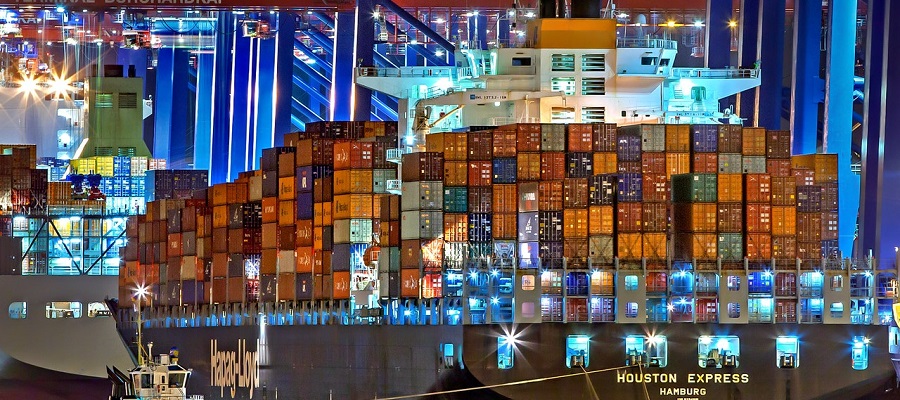FOB and CIF are the most famous incoterms. But what are incoterms? Incoterms are abbreviations used in international trade in goods. Among other things, they describe the assumption of costs and transport insurance as well as transfer points between exporter and importer. One of these Incoterms is FOB. The abbreviation stands for Free On Board. But what exactly does it mean?
FOB - Free On Board
Free On Board describes in the three letters FOB an agreement between trading partners. This means: The exporter delivers goods at his own expense and insurance up to the transport ship. From the moment the ship is loaded, the importer assumes all costs, obligations and risks for the transport to the destination.
FOB is not meaningful on its own. This is because the abbreviation does not name the port of transshipment, for example. Therefore, importers often add a port designation. FOB then becomes FOB Shanghai or FOB Hamburg, for example.
Note: The abbreviation originally referred only to shipments by ship. Increasingly, it is also used for shipments by other modes of transportation (for example, air freight).
Example of an FOB agreement
To understand the specifics of this commercial arrangement, an example is helpful. A company from Germany orders electrical appliances in China for resale in its own stores. The Chinese partner offers FOB Shanghai. This means that the manufacturer delivers the electrical appliances to the port of the Chinese metropolis at its own expense, takes care of transhipment onto the ship and handles the export formalities. This includes export taxes and customs duties.
 Agreement - Source: pexels.com
Agreement - Source: pexels.com
In order to be able to put the goods on the ship at all, the importer must inform his trading partner of all the destination data in good time. This includes which ship is to be loaded at which berth in which port by which date.
Once the goods are on the ship, the importing company assumes responsibility. This includes all costs for the transport route via ship to the European port as well as the onward transport to the own warehouse. In addition to freight costs, this also includes fees for ship brokers and, if applicable, stowage costs (transhipment costs). The company must also bear all customs and import formalities and any resulting costs for the electrical equipment. At the same time, it assumes the risk of loss and damage from the port of departure. If the electrical equipment is to be delivered to a central warehouse, the importer must take responsibility for the entire logistics chain from Shanghai.
In short, the Chinese supplier transfers the goods to a designated ship at his own expense. Once the goods are on board, all costs, obligations and risks are transferred to the German company.
Variants: pure FOB and non-genuine FOB
In practice, there are several variants of the pure FOB. In the transport and logistics industry, two supplements are particularly common: firstly, the so-called genuine FOB and secondly, the non-genuine FOB.
Genuine FOB
A genuine FOB exists when the exporter delivers the goods to the ship free of export duties. In this case, it has taken over all customs and export formalities as well as all costs incurred to date. From this point on, the importer has all the freedom to deal with the goods as he sees fit. He concludes the transport contract and can decide for himself how to proceed. At the same time, he bears the complete responsibility for the import.
Non-genuine FOB
There is an important change with the so-called non-genuine FOB. Here, the importer commissions his supplier to handle the shipment, including the transport contract and all costs incurred. The abbreviation is then FOB shipped. Important: Although the exporter orders the shipment, the importer still pays the costs. This is an agency agreement between the trading partners.
There are other variants. One of them is also significant for maritime trade: FOB stowed. This means that the exporter must also bear the costs of the loading berth as well as shunting there if the goods are already on the ship.
Advantages and disadvantages of the Free On Board agreement
At first glance, Free On Board does not seem particularly advantageous for the importer. This is because the importer assumes complete responsibility and risk from the port of export. Alternatives such as CIF (Cost, Insurance, Freight) seem attractive, as the complete costs for transport and insurance up to the port of destination are included. But exporters pay for this service with expensive surcharges. The importer is not in a position to decide on transport routes and costs himself, but still bears the risk from the time of shipment at the port of export.
 When FOB goes wrong - Source: foodporty.com
When FOB goes wrong - Source: foodporty.com
Advantages of FOB
The Free On Board agreement offers the importer the following advantages:
- The supplier can offer significantly better conditions, as he only has to bring the goods as far as the ship.
- The importer can find the best compromise between favorable transport costs and speed and can react completely flexible to the market in his decision.
- The takeover of the goods, responsibility and costs are in one hand from the point of transfer.
- The export duty is paid by the trading partner.
Disadvantages of FOB
Nevertheless, there are disadvantages when this arrangement is made. These include:
The supplier charges a surcharge on top of the actual costs up to the point of loading.
The supplier may not adequately meet its obligation to clear or pay costs.
In ports where carriers move goods, the legal transfer point is that to the carrier. If loss or damage occurs before shipment, the importer is liable despite outstanding loading on the ship. Depending on the goods, an FCA (free carrier) agreement may be more appropriate.
Packing goods safely for export
FOB can also be an agreement for export from Germany. In this case, the supplier should safely pack his goods in sturdy and high quality cardboard boxes. In our store we offer for FOB transfer points at German ports first-class cardboard boxes for goods of all kinds with an attractive price-performance ratio!



